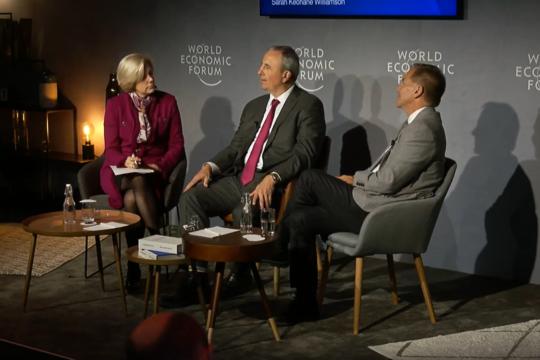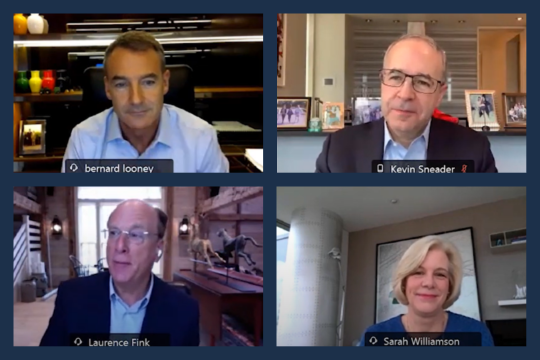
Political uncertainty needn’t capsize an organization’s long-term strategy. Rather, through good governance and investing in stakeholder engagement, businesses can cut through the noise of what’s expected of them and stay true to their purpose.

Political uncertainty needn’t capsize an organization’s long-term strategy. Rather, through good governance and investing in stakeholder engagement, businesses can cut through the noise of what’s expected of them and stay true to their purpose.
By Joel Paula
Multinational organizations are facing mounting tensions across many fronts. After decades of a more interconnected world economy, the tide has turned against globalization and a global decoupling threatens. Trade, taxation, data governance, intellectual property, labor, and competition have all become points of friction for firms that operate across jurisdictions. The effects of the pandemic, particularly on global supply chains, have accelerated these trends, forcing companies to adapt their investment, growth plans, and allocation of resources to deal with greater political uncertainty, supply bottlenecks, and more frequent disruptions.
For capital markets participants, the nature of political risk has been changing as well. In many developed markets, domestic political divides have been deepening and becoming more volatile, driving greater political uncertainty and risk in core markets. Though the elephant in the room is certainly strained US-China relations, a number of examples including Brexit, the “gilets jaunes” protests in France, tensions in eastern Europe, and yawning fault lines in US politics are contributing to uncertainties.
The US features prominently in the Eurasia Group’s list of top ten political risks of 2022, as domestic political risk has been increasing so much compared to prior decades. According to the Pew Research Center, 47% of Americans believe the political system requires major changes. Pressing China on human rights – even if it hurts economic relations – has Americans’ bipartisan support, with seven out of ten adults holding this view.
Regulators too are clamping down on firms.
We talk about geopolitical risk differently now. In prior periods, geopolitical risk had been mainly driven by geopolitical tensions, major macroeconomic imbalances, or individual country risk in emerging markets – the Asian financial crisis of 1997 being a prime example of this type of country risk. In the current environment, multinational organizations are increasingly posing questions of an existential nature, like how election outcomes can affect where and how firms operate or finance themselves, how the pandemic will affect business in a lasting way, or how to respond to social and cultural demands of consumers and employees.
Fortunately, there are options that companies can enact now to invest and plan for the long term. Strong governance frameworks across multiple areas such as corporate governance, product governance, and data, are at the heart of resilient business models. Systems put into place that enable sound decision making, accountability and responsiveness in times of stress, and an ability to cope with changing circumstances can help to mitigate uncertain political outcomes. Furthermore, a more holistic cross-functional approach to the management of multiple sources of political risk may be needed, in order to protect firm value and increase growth.
Understanding responsibilities and how they evolve in the context of political uncertainty will create challenges and opportunities. Determining which expectations to accept as responsibilities is based on the long-term purpose of the organization, its constituents, and the tradeoffs that accepting a particular responsibility would entail. FCLTGlobal’s recent report, Ripples of Responsibility: How Long-term Investors Navigate Uncertainty with Purpose, provides guidance for firms and a toolkit to help inventory, anticipate, and fulfill responsibilities.
This is particularly important as constituents like employees and consumers, empowered and enabled through social media, increasingly make demands on multinational organizations. 65% of millennials say they have boycotted a brand whose position on a social issue they opposed. Facing more powerful and influential groups, multinational organizations will have to allocate more resources to negotiating environmental, cultural, and political minefields.
Considerable headwinds remain for firms that operate across boundaries, even as governance and sustainability frameworks can help mitigate risks. Good long-term governance is defined differently in different regions (e.g., China, US, EU) and across ownership structures (e.g., publicly held, privately held, family owned, state owned), which in turn affects implementation of new ideas or governance standards. Taking a stand on one issue may require a complete reorientation, and while making one group of constituents happy, may damage relations with other groups or even governments.
International standards – and adherence to them – are potentially part of the solution. A European Commission proposal on corporate due diligence and accountability would set the bar for governance standards, environment, and human rights compliance within the EU. International work on promoting trust in business, such as the OECD Trust in Business Initiative, can also help in achieving broader agreement on guidelines and standards for fair, sustainable, and resilient economic development.
But perhaps most of all, it requires practical solutions that prompt organizations to think hard about their purpose, responsibilities, and how they communicate them, fostering a sense of authenticity and trust in their actions. FCLTGlobal’s work on multi-stakeholder capitalism is leading the discussion on practical solutions to maximize long-term value creation by focusing on key stakeholders. By investing in stakeholder engagement, including governance, investor-corporate dialogue, aligned incentives, and better metrics to measure risks and opportunities, organizations have a better chance of striking a balance in an increasingly fragmented business environment.

Stakeholder Capitalism, Governance | Video
22 January 2020 - The shift towards stakeholder capitalism calls for a new vision of good environmental, social and corporate governance. What difficult decisions must chief executives take to pivot towards stronger governance by stakeholders?

Governance | Report
19 July 2021 - Despite the evidence of the benefits of increased leadership diversity, progress at private companies has been slow.

Investor-Corporate Engagement, Climate | Article
23 November 2020 - Larry Fink, Bernard Looney, and Kevin Sneader discuss a global transition to more sustainable business models